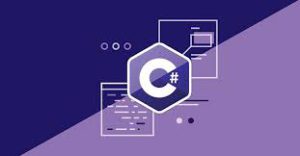Exploring the Power and Versatility of C#
In the ever-evolving landscape of software development, the choice of programming language can significantly impact the success of a project. C#, pronounced as “C-sharp,” stands out as a powerful and versatile language that has gained widespread adoption. In this comprehensive guide, we will delve into the world of C#, its foundations, key features, real-world applications, and the path to becoming a proficient C# developer.
Understanding C#
C# is an object-oriented, high-level programming language developed by Microsoft as part of the .NET initiative. It was first introduced in the early 2000s and has since evolved into a robust language used for a wide range of applications, from desktop software to web applications, games, mobile apps, and more.
 Key Features of C#
Key Features of C#
- Simple and Readable Syntax: C# boasts a clean and intuitive syntax, making it relatively easy for developers to read and write code. Its syntax is similar to other C-style languages like C++ and Java, making it accessible to those familiar with these languages.
- Strongly Typed: C# is a strongly typed language, which means that variables must be explicitly declared with their data types. This enhances code reliability and reduces the likelihood of runtime errors.
- Object-Oriented: C# follows the principles of object-oriented programming (OOP), allowing developers to create modular, reusable code through classes and objects. OOP promotes code organization and maintainability.
- Platform Independence: While initially developed for Windows-based applications, C# has evolved to become cross-platform. With the advent of .NET Core (now .NET 5 and later), C# applications can run on Windows, macOS, and Linux.
- Rich Standard Library: C# benefits from a vast standard library (also known as the .NET Framework or .NET Core) that provides pre-built code and libraries for common tasks, such as file I/O, network communication, and data manipulation.
Real-World Applications of C#
C# has found applications in various domains, highlighting its adaptability and versatility:
- Desktop Software: C# is often used to develop Windows desktop applications. The Windows Presentation Foundation (WPF) and Windows Forms (WinForms) frameworks facilitate the creation of graphical user interfaces (GUIs) for applications.
- Web Development: With ASP.NET, C# is a powerful language for web development. ASP.NET Core, the cross-platform version of ASP.NET, enables the creation of modern, high-performance web applications.
- Game Development: Unity3D, one of the most popular game engines, uses C# as its primary scripting language. Game developers leverage C# to create interactive and visually stunning games for various platforms.
- Mobile Apps: Xamarin, a framework for building cross-platform mobile apps, relies on C# as the primary language. Developers can write code once and deploy it to iOS and Android platforms.
- Backend Development: C# is commonly used for building server-side applications, including web APIs, microservices, and cloud-based services. Its strong typing and performance characteristics make it suitable for backend development.
Becoming Proficient in C#
If you’re eager to embark on a journey to become proficient in C#, here are some essential steps to get you started:
- Install Visual Studio: Visual Studio is a powerful integrated development environment (IDE) for C# development. Install Visual Studio or Visual Studio Code, a lightweight alternative, to begin coding in C#.
- Learn the Basics: Start by mastering the basics of C#, including variables, data types, operators, control structures (if statements, loops), and functions.
- Object-Oriented Programming (OOP): Gain a strong understanding of OOP principles, including classes, objects, inheritance, polymorphism, and encapsulation.
- Explore Frameworks: Familiarize yourself with relevant frameworks like ASP.NET Core for web development and Unity3D for game development.
- Build Projects: Practice is key to mastering C#. Start with small projects, such as console applications or simple web applications, and gradually work your way up to more complex projects.
- Leverage Online Resources: Utilize online tutorials, courses, and coding communities to expand your knowledge and connect with fellow C# developers.
Conclusion
C# has established itself as a versatile and powerful programming language with a broad spectrum of applications. Its simplicity, readability, and robustness make it an attractive choice for both newcomers and seasoned developers. Whether you aspire to create desktop applications, web services, games, or mobile apps, C# equips you with the tools and capabilities to turn your ideas into functional, efficient, and reliable software. So, dive into the world of C#, explore its vast ecosystem, and embark on a rewarding journey of coding excellence.

